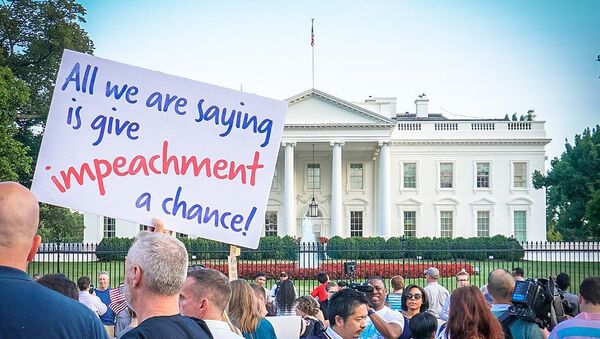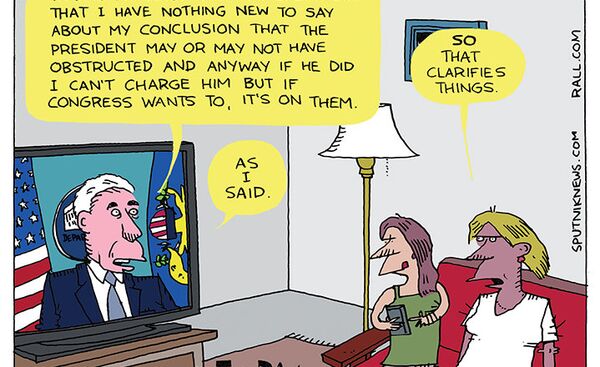In what became his final words as special counsel before resigning, Mueller spoke at the US Department of Justice offices in Washington, DC, about the results of the two-year investigation into alleged collusion between Trump's 2016 election campaign and the Russian government. The report, delivered last month, found no evidence of collusion, but it remained neutral on the question of whether or not Trump obstructed justice by interfering with the investigation.
Mueller attempted to defuse much of the last month's Beltway drama by explaining exactly why his investigation concluded what it did, and did not suggest specific courses of action. However, in those words — or rather in between them — Democrats found new kindling for their battle to impeach the president.
"The order appointing me special counsel authorized us to investigate actions that could obstruct the investigation," Mueller said Wednesday, noting that "if we had had confidence that the president clearly did not commit a crime, we would have said so. We did not, however, make a determination as to whether the president did commit a crime."
Mueller noted that it was "long standing department policy" for the DOJ that "a president cannot be charged with a federal crime while he is in office. That is unconstitutional… it would be unfair to potentially accuse somebody of a crime when there can be no court resolution of the actual charge."
He further noted that "the Constitution requires a process other than the criminal justice system to formally accuse a sitting president of wrongdoing."
That, for Democrats, has become a Bat Signal, summoning them to rally for new articles of impeachment against Trump for this supposed obstruction of justice.
"Robert Mueller's statement makes it clear," said New Jersey senator and Democratic presidential candidate Cory Booker on his Twitter Wednesday morning. "Congress has a legal and moral obligation to begin impeachment proceedings immediately."
Robert Mueller’s statement makes it clear: Congress has a legal and moral obligation to begin impeachment proceedings immediately.
— Cory Booker (@CoryBooker) May 29, 2019
"Mueller is playing a game of Taboo with Congress," wrote New York congresswoman Alexandria Ocasio-Cortez, referring to the party game in which one player can't say the word others are trying to guess. "His word is ‘impeach.'"
Mueller is playing a game of Taboo with Congress.
— Alexandria Ocasio-Cortez (@AOC) May 29, 2019
His word is “impeach.” https://t.co/mS4K8faLCw
Likewise, House Judiciary Committee chair Jerry Nadler, a key opponent of Trump's and a leading paladin of the Democratic crusade against the president who recently considered subpoenaing Mueller to testify, said in a statement that "given that Special Counsel Mueller was unable to pursue criminal charges against the president, it falls to Congress to respond to the crimes, lies and other wrongdoing of President Trump — and we will do so."
Democrats were joined by some Republicans, too, like Michigan Rep. Justin Amash, who broke ranks recently to call for Trump's impeachment.
The ball is in our court, Congress. https://t.co/idpQo1xItH
— Justin Amash (@justinamash) May 29, 2019
In a statement following Mueller's remarks, House Speaker Nancy Pelosi (D-CA) repudiated the DOJ's position, saying "no one is above the law — not even the president."
"The Special Counsel's report revealed that the President's campaign welcomed Russian interference in the election, and laid out eleven instances of the President's obstruction of the investigation," the chief Democratic lawmaker in the House said. "The Congress holds sacred its constitutional responsibility to investigate and hold the President accountable for his abuse of power. The Congress will continue to investigate and legislate to protect our elections and secure our democracy."
However, later on Wednesday, Pelosi seemed to display more of the lethargy for pursuing an actual impeachment case that she's shown in recent months.
"Nothing is off the table," Pelosi, said at an event in San Francisco. "What we do want to make is such a compelling case, such an iron-clad case, that even the Republican Senate, which at the time seems to be not an objective jury, will be convinced of the path that we have to take as a country."
The US Senate, which is controlled by the president's Republican Party by a 53 to 47 majority, is a key obstacle to impeachment proceedings. For a president to be convicted in impeachment proceedings, a two-thirds majority is required, and aisle-crossers like Amash are far too few for such a grouping to likely coalesce.
"I think it would be disposed of very quickly. If it's based on the Mueller report, or anything like that, it would be quickly disposed of," Senate Judiciary Committee Chair Lindsey Graham said Wednesday.
A sitting US president has never been convicted during impeachment proceedings before. President Andrew Johnson, who took over after Abraham Lincoln was assassinated in 1865, narrowly missed a conviction by a single vote, and Richard Nixon retired before what many considered a likely conviction could be delivered. President Bill Clinton was acquitted on the charge of obstruction of justice, but the Senate was tied 50-50 as to whether or not he lied to Congress during the investigation.






